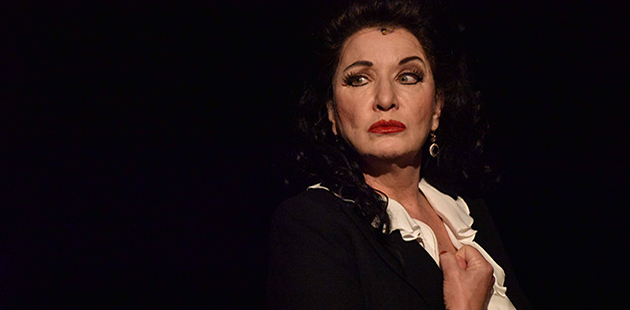 Details get lost over time. These days people are `passionate’ about things like football or customer service. Historically, as in The Passion of Christ, the word related to suffering, not enthusiasm. Masterclass by Terrence McNally revolves around the passionate relationships of the New York-born Greek known as Maria Callas, mostly connected to the world of opera.
Details get lost over time. These days people are `passionate’ about things like football or customer service. Historically, as in The Passion of Christ, the word related to suffering, not enthusiasm. Masterclass by Terrence McNally revolves around the passionate relationships of the New York-born Greek known as Maria Callas, mostly connected to the world of opera.
Masterclass draws its inspiration from a series of classes given by Callas for young singers at Manhattan’s The Juilliard School in the 1971-2 academic year. The play presents one such afternoon class. If the work accurately follows history, Callas (Amanda Muggleton) is in her late forties, and has sung professionally for around 30 years. Her personal and professional life have had ups and downs as dramatic as those of an operatic heroine.
On arriving, this Callas quickly showed herself to be of the diva mould, failing to recall gifted accompanist Manny Weinstock (Dobbs Franks) she’d practiced with shortly before.
Early in the class, and a few times afterwards, “La Divina” asserted to the audience that none of your suffering matters, only your work. As singers took their turn to receive instruction, clearly Callas thought they hadn’t suffered enough, and would benefit from hearing about her hardships.
Self-involvement aside, Callas wasn’t the most supportive teacher. Through trying to make performers nervous before they started singing or taking a swipe at how they dressed, Callas willingly gave these aspirants to a life in opera some `tough love’.
These accomplished recipients were sopranos Sophie De Palma (Karla Gare) and Sharon Graham (Jessica Boyd), and tenor Tony Candolino (Rocco Speranza). On taking the stage, nervy Gare and cocky Speranza enabled comedic moments as Callas sought to bluntly disabuse them of beliefs about their own talents, or the nature of opera itself.
In order to give insight into this diva’s haughty or prickly turns, McNally’s script taps into Callas’ history. Would-be mentees have selected arias Callas performed at critical stages of her life. Recalling these times allowed Muggleton to share Callas’ times of self-doubt, regarding her not-so-classical appearance, or the durability of her voice. Also illustrative were re-enacted conversations, such as with mega-rich Aristotle Onassis, the coarse opera skeptic who would not return her love.
Some may find that extended playback of Callas’ performances or the occasional projected images aren’t particularly enlightening. Those conversant with the history and stars of opera may find the recordings evidence of why Callas thought she had no rivals, believing that no-one could do what she did.
Given McNally’s propensity for satire, I had thought that Masterclass might use a personal story to pose broader social questions, as in Marguerite Duras’ L’Amante Anglaise. It’s more like a celebrity biography, lacking the depth of literature whilst still being an often lively and entertaining excursion.
To a large extent this is due to the conflict between characters. When Boyd’s Graham (in clearly a good piece of casting) showed an agile voice and was adept at taking direction on her acting, Callas offered praise. Yet, as a prime example of the deft timing of Adam Spreadbury-Maher’s direction, a put down from Muggleton followed, spaced so as to create delicious ambiguity over whether Callas was unfailingly honest, or merely jealous of an up-and-coming rival.
Through these touches, we see that this is not just a masterclass from Callas, but also from Muggleton. Whether droll or fierce, her performance gleamed like her confident red lipstick and nailpolish, her accent unfailing and her commanding presence suited to Callas’ reputation as a tigress. Many actors could benefit from observing the sparse effectiveness of many scenes, focusing our attention on the character, not the acting.
If we give weight to some of the play’s more minor threads, there’s comment on how the world often places more importance on looks than talent. We can also find advice. Over her life in opera, Callas couldn’t abide mere singing, demanding scholarship and commitment from her students. Her passion for singing reminds us of what can be achieved when we strive for great and individual work.
What we see in the life of Callas also features in the broader cult of celebrity. Perhaps we should ask, for the sake of others, should there be a limit to how much we indulge the behaviour of a passionate, gifted person?
Masterclass
The Lawler – Southbank Theatre, Southbank Boulevard, Southbank
Performance: Saturday 6 January 2018 – 7:30pm
Season continues to 27 January 2018
Information and Bookings: www.mtc.com.au
Following its Melbourne season, Masterclass will be presented at the Canberra Theatre Centre: 22 – 24 February; and the Theatre Royal, Hobart: 28 February – 2 March 2018.
Image: Amanda Muggleton as Maria Callas – photo by Kate Ferguson
Review: Jason Whyte
